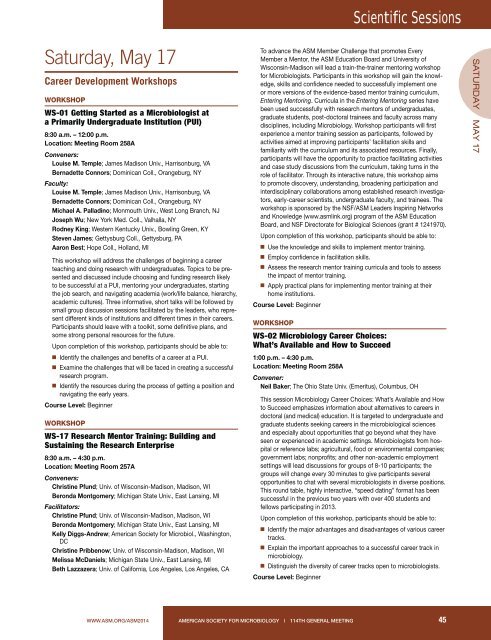asm2014_Comp_Web
asm2014_Comp_Web
asm2014_Comp_Web
Create successful ePaper yourself
Turn your PDF publications into a flip-book with our unique Google optimized e-Paper software.
Scientific Sessions<br />
Saturday, May 17<br />
Career Development Workshops<br />
WORKSHOP<br />
WS-01 Getting Started as a Microbiologist at<br />
a Primarily Undergraduate Institution (PUI)<br />
8:30 a.m. – 12:00 p.m.<br />
Location: Meeting Room 258A<br />
Conveners:<br />
Louise M. Temple; James Madison Univ., Harrisonburg, VA<br />
Bernadette Connors; Dominican Coll., Orangeburg, NY<br />
Faculty:<br />
Louise M. Temple; James Madison Univ., Harrisonburg, VA<br />
Bernadette Connors; Dominican Coll., Orangeburg, NY<br />
Michael A. Palladino; Monmouth Univ., West Long Branch, NJ<br />
Joseph Wu; New York Med. Coll., Valhalla, NY<br />
Rodney King; Western Kentucky Univ., Bowling Green, KY<br />
Steven James; Gettysburg Coll., Gettysburg, PA<br />
Aaron Best; Hope Coll., Holland, MI<br />
This workshop will address the challenges of beginning a career<br />
teaching and doing research with undergraduates. Topics to be presented<br />
and discussed include choosing and funding research likely<br />
to be successful at a PUI, mentoring your undergraduates, starting<br />
the job search, and navigating academia (work/life balance, hierarchy,<br />
academic cultures). Three informative, short talks will be followed by<br />
small group discussion sessions facilitated by the leaders, who represent<br />
different kinds of institutions and different times in their careers.<br />
Participants should leave with a toolkit, some definitive plans, and<br />
some strong personal resources for the future.<br />
Upon completion of this workshop, participants should be able to:<br />
■ Identify the challenges and benefits of a career at a PUI.<br />
■ Examine the challenges that will be faced in creating a successful<br />
research program.<br />
■ Identify the resources during the process of getting a position and<br />
navigating the early years.<br />
Course Level: Beginner<br />
WORKSHOP<br />
WS-17 Research Mentor Training: Building and<br />
Sustaining the Research Enterprise<br />
8:30 a.m. – 4:30 p.m.<br />
Location: Meeting Room 257A<br />
Conveners:<br />
Christine Pfund; Univ. of Wisconsin-Madison, Madison, WI<br />
Beronda Montgomery; Michigan State Univ., East Lansing, MI<br />
Facilitators:<br />
Christine Pfund; Univ. of Wisconsin-Madison, Madison, WI<br />
Beronda Montgomery; Michigan State Univ., East Lansing, MI<br />
Kelly Diggs-Andrew; American Society for Microbiol., Washington,<br />
DC<br />
Christine Pribbenow; Univ. of Wisconsin-Madison, Madison, WI<br />
Melissa McDaniels; Michigan State Univ., East Lansing, MI<br />
Beth Lazzazera; Univ. of California, Los Angeles, Los Angeles, CA<br />
To advance the ASM Member Challenge that promotes Every<br />
Member a Mentor, the ASM Education Board and University of<br />
Wisconsin-Madison will lead a train-the-trainer mentoring workshop<br />
for Microbiologists. Participants in this workshop will gain the knowledge,<br />
skills and confidence needed to successfully implement one<br />
or more versions of the evidence-based mentor training curriculum,<br />
Entering Mentoring. Curricula in the Entering Mentoring series have<br />
been used successfully with research mentors of undergraduates,<br />
graduate students, post-doctoral trainees and faculty across many<br />
disciplines, including Microbiology. Workshop participants will first<br />
experience a mentor training session as participants, followed by<br />
activities aimed at improving participants’ facilitation skills and<br />
familiarity with the curriculum and its associated resources. Finally,<br />
participants will have the opportunity to practice facilitating activities<br />
and case study discussions from the curriculum, taking turns in the<br />
role of facilitator. Through its interactive nature, this workshop aims<br />
to promote discovery, understanding, broadening participation and<br />
interdisciplinary collaborations among established research investigators,<br />
early-career scientists, undergraduate faculty, and trainees. The<br />
workshop is sponsored by the NSF/ASM Leaders Inspiring Networks<br />
and Knowledge (www.asmlink.org) program of the ASM Education<br />
Board, and NSF Directorate for Biological Sciences (grant # 1241970).<br />
Upon completion of this workshop, participants should be able to:<br />
■ Use the knowledge and skills to implement mentor training.<br />
■ Employ confidence in facilitation skills.<br />
■ Assess the research mentor training curricula and tools to assess<br />
the impact of mentor training.<br />
■ Apply practical plans for implementing mentor training at their<br />
home institutions.<br />
Course Level: Beginner<br />
WORKSHOP<br />
WS-02 Microbiology Career Choices:<br />
What’s Available and How to Succeed<br />
1:00 p.m. – 4:30 p.m.<br />
Location: Meeting Room 258A<br />
Convener:<br />
Neil Baker; The Ohio State Univ. (Emeritus), Columbus, OH<br />
This session Microbiology Career Choices: What’s Available and How<br />
to Succeed emphasizes information about alternatives to careers in<br />
doctoral (and medical) education. It is targeted to undergraduate and<br />
graduate students seeking careers in the microbiological sciences<br />
and especially about opportunities that go beyond what they have<br />
seen or experienced in academic settings. Microbiologists from hospital<br />
or reference labs; agricultural, food or environmental companies;<br />
government labs; nonprofits; and other non-academic employment<br />
settings will lead discussions for groups of 8-10 participants; the<br />
groups will change every 30 minutes to give participants several<br />
opportunities to chat with several microbiologists in diverse positions.<br />
This round table, highly interactive, “speed dating” format has been<br />
successful in the previous two years with over 400 students and<br />
fellows participating in 2013.<br />
Upon completion of this workshop, participants should be able to:<br />
■ Identify the major advantages and disadvantages of various career<br />
tracks.<br />
■ Explain the important approaches to a successful career track in<br />
microbiology.<br />
■ Distinguish the diversity of career tracks open to microbiologists.<br />
Course Level: Beginner<br />
SATURDAY MAY 17<br />
WWW.ASM.ORG/ASM2014 AMERICAN SOCIETY FOR MICROBIOLOGY | 114TH GENERAL MEETING 45


